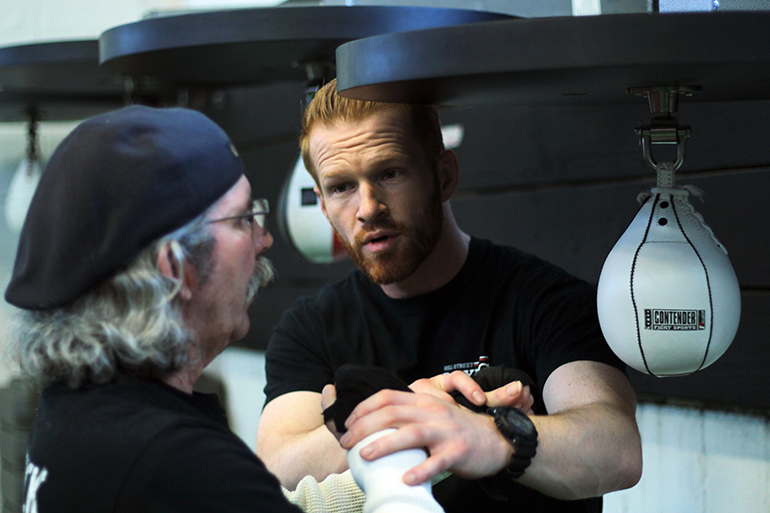Stronger Than Yesterday: Boxing for Adaptive Athletes

The words “Stronger Than Yesterday” stretch large across the wall inside Hill Street Boxing’s Southampton gym, and they couldn’t prove more true for one group of locals struggling to overcome their illnesses.
Launched on Wednesday, January 29, the Hill Street Boxing Wellness Program for Adaptive Athletes seeks to enhance quality of life for people with disabilities through boxing by empowering participants in their daily lives, and improving their overall health, independence and well-being. Even after one class, several attendees said they felt better, mentally and physically, from the exercise, fellowship and simply going out and doing something positive and proactive.

Though others will join them, the program is currently run by three coaches, including Hill Street Boxing (HSB) founding trainer and manager Avery Crocker; Debra McKay, a certified personal trainer and boxing instructor who regularly assists athletes with disabilities; and Michael Green, a Bridgehampton local with a Wall Street background and experience in various martial arts, as well as training athletes with disabilities. McKay and Green have both worked assisting Parkinson’s sufferers, and they reunited while training under Crocker at the ample HSB facilities.
Eventually, after discussing possibilities, the friends realized HSB would be ideal to continue their work—only this time, they’d start their own program and offer classes to a wider range of people in need of help. “I said, ‘Wow, wouldn’t it be a great idea to bring adaptive athletes into this space?’” McKay recalls, explaining how they came to Crocker and HSB owner and trainer Thomas Haynia with the idea to offer a free program with all volunteer coaches.

Green says the program is in its infancy, and they’re hoping to attract more locals with a variety of needs, including those working to manage post-traumatic stress disorder, Alzheimer’s disease, Down syndrome, depression and other disabilities. “Any mental or physical illness, they can come and box,” Green says, pointing out that Crocker is an “amazing boxing coach and trainer—probably the best out here,” and that the program exists thanks to him and Haynia donating their space.
On the first day of the adaptive athletes program, participants powered through a long series of drills while coaches tailored the difficulty to meet individual needs. One student, McKay’s private training client and a Parkinson’s patient, Jim Powers, has progressed to the point in his disease where walking is difficult, yet he tackled each challenge with enthusiasm and drive. He hit the speed bag from a sitting position and consistently attempted to surpass what coaches felt comfortable allowing him to do.

“For somebody like him, it’s the socialization and having other people around him that he can relate to,” McKay says, explaining that Powers is a former Golden Gloves boxer, so the program is perfect for him. “It just makes him feel alive. It gives him hope. It allows him to function better every day.”
Another participant, whose Parkinson’s is less advanced, and prefers to remain anonymous, told McKay that boxing is outside his usual, sedentary routine, but he was glad he attended the class. “When he left, he was sore the next day, but he felt like his nerves were awakened,” the trainer says, noting that boxing can do much for all kinds of ailments. “There’s always something new to learn,” McKay says, describing the sport as “very therapeutic,” even in her own life.

“Giving back and helping others is something we should all strive to do,” Green says, echoing a sentiment shared by Crocker and McKay. They’ve only just begun, but the coaches see a bright future for their program. Now it’s up to suffering residents to step up and join them.
To be a part of the Hill Street Boxing Wellness Program for Adaptive Athletes, call Michael Green at 631-793-4621, or contact Debra McKay at 631-258-3394 or dbhmckay@gmail.com.




